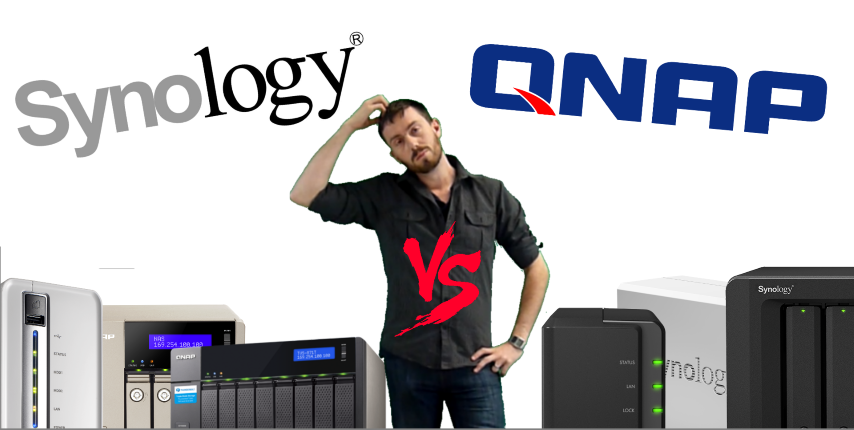Should I buy a Synology or QNAP NAS?
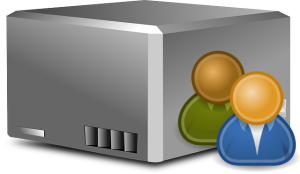 Possibly the most common question I am asked when it comes to NAS. Like the ancient battles of Windows Vs Mac, Nintendo Vs Sega and Coke Vs Pepsi, both brands have their die hard fan base that will happily argue long in to the night! But unlike the previous fanboy arguments, QNAP and Synology once had very different markets that they wanted to cater for. It wasn’t until the last couple of years when NAS and the security and stability of Network Attached Storage servers evolved so rapidly, that the two companies find themselves in a head to head choice for most consumers. Of course both have their own strengths and weaknesses both in terms of their brand and indeed the units they sell. So, today we want to shed a little light on these two and give you a broader understanding of each brand and hopefully help you solve whether you need to buy a Synology NAS or a QNAP NAS for your home and/or business.
Possibly the most common question I am asked when it comes to NAS. Like the ancient battles of Windows Vs Mac, Nintendo Vs Sega and Coke Vs Pepsi, both brands have their die hard fan base that will happily argue long in to the night! But unlike the previous fanboy arguments, QNAP and Synology once had very different markets that they wanted to cater for. It wasn’t until the last couple of years when NAS and the security and stability of Network Attached Storage servers evolved so rapidly, that the two companies find themselves in a head to head choice for most consumers. Of course both have their own strengths and weaknesses both in terms of their brand and indeed the units they sell. So, today we want to shed a little light on these two and give you a broader understanding of each brand and hopefully help you solve whether you need to buy a Synology NAS or a QNAP NAS for your home and/or business.
What about Netgear NAS? WD My Cloud NAS and Thecus? Where are they?
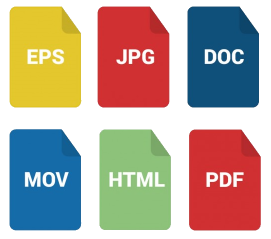 It is of course the case that the market is bigger than just two NAS vendors. Netgear (those pioneers of a great many network enabled devices) have their ranges in the NAS genre – their ReadyNAS range is available to buy now from nascompares.com and is excellent. Likewise WD MyCloud is a is firm favourite among Apple and Windows users alike and their WD My Cloud EX2 Ultra released recently has really turned some heads. Sadly for these guys the lion share of the NAS market is still heavily populated by the guys at QNAP and Synology and this is largely due to their NAS devices being so diverse.
It is of course the case that the market is bigger than just two NAS vendors. Netgear (those pioneers of a great many network enabled devices) have their ranges in the NAS genre – their ReadyNAS range is available to buy now from nascompares.com and is excellent. Likewise WD MyCloud is a is firm favourite among Apple and Windows users alike and their WD My Cloud EX2 Ultra released recently has really turned some heads. Sadly for these guys the lion share of the NAS market is still heavily populated by the guys at QNAP and Synology and this is largely due to their NAS devices being so diverse.
Indeed if you want traditional NAS services such as simple Cloud Backup and low resource media servers (like iTunes servers and DLNA access devices) then you can still consider brands like these, as well as Thecus NAS and Asustor. However the minute you want more specialised services like VMware (virtual Machines), NVR Surveillance via IP Cameras, multiple large volume Apple Time Machine images, the you will struggle to find a mainstream NAS outside of Synology and QNAP that will give you that level of expandability.
Why should you buy Synology NAS
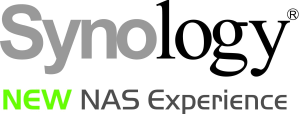 Synology are the Mac favourite when it comes to NAS. Almost all NAS devices you will find are compatible with both Windows and Mac, but for sheer intuitive use and familiarity with the operating system, if you are a Mac user, then you will almost always be recommended to go for a Synology NAS server. In many ways to marketing, use and target audience of a Synology NAS will be very familiar to those who use Apple devices regularly. Unlike their biggest rival QNAP, synology run a tighter ship when it comes to their apps and how you can tinker with the device. Almost all Synology NAS devices are designed for Network access on – so things like connecting peripherals, HDMI monitors for direct access and the more advanced connections like 10GBe and thunderbolt are largely absent. Another often highlighted factor is that the hardware is generally like for like lower than their comparable units at QNAP, often charging buyers somewhere in the region or around £50-100 more for hardware than QNAP. So, given these two factors, why is Synology NAS so appealing? Well that bring us back to the similarity to Apple. Synology NAS is a very stable NAS platform. You won’t find many Beta software in the app store. The design of the NAS chassis’ are uniform, modern and minimalist. Using a Synology NAS is a very smooth and user-friendly experience, with most of the hard decisions or technical details happening in the background. Alongside these facts, you generally have lower noise and lower power consumption when compared to likewise QNAP models, making them a great NAS for homes and small offices.
Synology are the Mac favourite when it comes to NAS. Almost all NAS devices you will find are compatible with both Windows and Mac, but for sheer intuitive use and familiarity with the operating system, if you are a Mac user, then you will almost always be recommended to go for a Synology NAS server. In many ways to marketing, use and target audience of a Synology NAS will be very familiar to those who use Apple devices regularly. Unlike their biggest rival QNAP, synology run a tighter ship when it comes to their apps and how you can tinker with the device. Almost all Synology NAS devices are designed for Network access on – so things like connecting peripherals, HDMI monitors for direct access and the more advanced connections like 10GBe and thunderbolt are largely absent. Another often highlighted factor is that the hardware is generally like for like lower than their comparable units at QNAP, often charging buyers somewhere in the region or around £50-100 more for hardware than QNAP. So, given these two factors, why is Synology NAS so appealing? Well that bring us back to the similarity to Apple. Synology NAS is a very stable NAS platform. You won’t find many Beta software in the app store. The design of the NAS chassis’ are uniform, modern and minimalist. Using a Synology NAS is a very smooth and user-friendly experience, with most of the hard decisions or technical details happening in the background. Alongside these facts, you generally have lower noise and lower power consumption when compared to likewise QNAP models, making them a great NAS for homes and small offices.
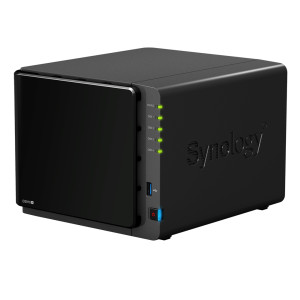 Not to say that Synology hasn’t been making waves in the medium and large business enterprise sector. With the release of DSM 6.0 (their NAS software) they have made bigger steps towards VMware and commercial NAS services. This is also coupled with large sized rackmounted NAS servers and high end Business class desktop units like the DS2015xs means that they are no longer so focused on the solo/small group NAS users. Synology NAS is still very much the joint first place for NAS worldwide and if you are considering a solid NAS that will do what it promises, is exceptionally user friendly as well as provide more common modern NAS needs these days like a Plex Media Server (I recommend the DS916+ 8GB here), a smaller scale standalone Surveillance NAS solution (such as the Synology NVR216 available to buy here) or scalable solutions that grow in line with your business, like the DS716+II, then Synology may very well be the choice for you.
Not to say that Synology hasn’t been making waves in the medium and large business enterprise sector. With the release of DSM 6.0 (their NAS software) they have made bigger steps towards VMware and commercial NAS services. This is also coupled with large sized rackmounted NAS servers and high end Business class desktop units like the DS2015xs means that they are no longer so focused on the solo/small group NAS users. Synology NAS is still very much the joint first place for NAS worldwide and if you are considering a solid NAS that will do what it promises, is exceptionally user friendly as well as provide more common modern NAS needs these days like a Plex Media Server (I recommend the DS916+ 8GB here), a smaller scale standalone Surveillance NAS solution (such as the Synology NVR216 available to buy here) or scalable solutions that grow in line with your business, like the DS716+II, then Synology may very well be the choice for you.
Why should you buy a QNAP NAS device?
 If Synology is Mac, then QNAP is most certainly Windows and Android! Straight away when you compare the specifications (both in terms of hardware and software) of a QNAP NAS versus a Synology, you will immediately notice that you get much better CPU’s and RAM options in the QNAP, as well as it costing less! Seems too good to be true! Alongside this you have greater direct access options. Across the spectrum of the QNAP range you appear spoilt for choice. HDMI ports on most QNAP NAS mean you can directly connect your NAS to a visual device and access the contents directly. The ability to connect a mouse, a keyboard, microphones, speakers and webcams mean you can turn a NAS into a standalone PC (as well as a standalone large scale surveillance NVR with the purchase of some IP Cameras). Options such as expansion cards to add 10GBe ethernet connections (almost all NAS arrive with 1GBe for network transfers) and even now more units that are being released with Thunderbolt 2 connections and m.2 SSD Cache slots. Still looking for the catch? I’ll get to it eventually I promise.
If Synology is Mac, then QNAP is most certainly Windows and Android! Straight away when you compare the specifications (both in terms of hardware and software) of a QNAP NAS versus a Synology, you will immediately notice that you get much better CPU’s and RAM options in the QNAP, as well as it costing less! Seems too good to be true! Alongside this you have greater direct access options. Across the spectrum of the QNAP range you appear spoilt for choice. HDMI ports on most QNAP NAS mean you can directly connect your NAS to a visual device and access the contents directly. The ability to connect a mouse, a keyboard, microphones, speakers and webcams mean you can turn a NAS into a standalone PC (as well as a standalone large scale surveillance NVR with the purchase of some IP Cameras). Options such as expansion cards to add 10GBe ethernet connections (almost all NAS arrive with 1GBe for network transfers) and even now more units that are being released with Thunderbolt 2 connections and m.2 SSD Cache slots. Still looking for the catch? I’ll get to it eventually I promise.
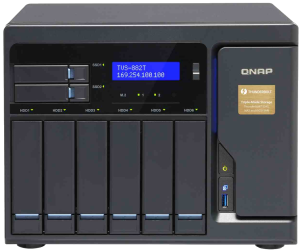 Next there is the operating system. Where Synology has DSM, QNAP has QTS. The QTS NAS software on the face of looks like cross between Android and iOs, this is coupled with a menu structure and options layout of windows. Like the Synology NAS operating system, a great many of the tougher more technical details are hidden in the background, but unlike the Synology, you have more free access to view and manipulate this information from the desktop. Many may find this a little intimidating and for many it will be the reason they pay the extra and go for a Synology. That isn’t to say that the QNAP isn’t user-friendly – it is very easy to use and very intuitive (remembering a large number of your choices to save time later).
Next there is the operating system. Where Synology has DSM, QNAP has QTS. The QTS NAS software on the face of looks like cross between Android and iOs, this is coupled with a menu structure and options layout of windows. Like the Synology NAS operating system, a great many of the tougher more technical details are hidden in the background, but unlike the Synology, you have more free access to view and manipulate this information from the desktop. Many may find this a little intimidating and for many it will be the reason they pay the extra and go for a Synology. That isn’t to say that the QNAP isn’t user-friendly – it is very easy to use and very intuitive (remembering a large number of your choices to save time later).
It it just isn’t quite as user-friendly straight off the bat as Synology. This coupled with the slightly more metallic chassis and higher power consumption may put a more conscientious NAS buyer off. That said whereas Synology seemed to divert a large degree of it’s attention to home and small business, QNAP has been targeting business (both big and small) for quite a long time and more and more been introducing those business features like Virtual Machines, ISCSI, real-time front mounted display panels, link aggregation over multiple ports and 10/40Gbe into their smaller home range NAS. Bottom line, if you are a Windows and/or android user, have even the tiniest pinch of IT knowledge and want more for your money, then you will want to go for the QNAP NAS range.
🔒 Join Inner Circle
Get an alert every time something gets added to this specific article!
This description contains links to Amazon. These links will take you to some of the products mentioned in today's content. As an Amazon Associate, I earn from qualifying purchases. Visit the NASCompares Deal Finder to find the best place to buy this device in your region, based on Service, Support and Reputation - Just Search for your NAS Drive in the Box Below
Need Advice on Data Storage from an Expert?
Finally, for free advice about your setup, just leave a message in the comments below here at NASCompares.com and we will get back to you. Need Help?
Where possible (and where appropriate) please provide as much information about your requirements, as then I can arrange the best answer and solution to your needs. Do not worry about your e-mail address being required, it will NOT be used in a mailing list and will NOT be used in any way other than to respond to your enquiry.
Need Help?
Where possible (and where appropriate) please provide as much information about your requirements, as then I can arrange the best answer and solution to your needs. Do not worry about your e-mail address being required, it will NOT be used in a mailing list and will NOT be used in any way other than to respond to your enquiry.

|
 |
Minisforum G7 Pro Review
CAN YOU TRUST UNIFI REVIEWS? Let's Discuss Reviewing UniFi...
WHERE IS SYNOLOGY DSM 8? and DO YOU CARE? (RAID Room)
UniFi Routers vs OpenWRT DIY Routers - Which Should You Choose?
WHY IS PLEX A BIT S#!t NOW? IS 2026 JELLYFIN TIME? (RAID Room)
Synology FS200T NAS is STILL COMING... But... WHY?
Access content via Patreon or KO-FI
Discover more from NAS Compares
Subscribe to get the latest posts sent to your email.


